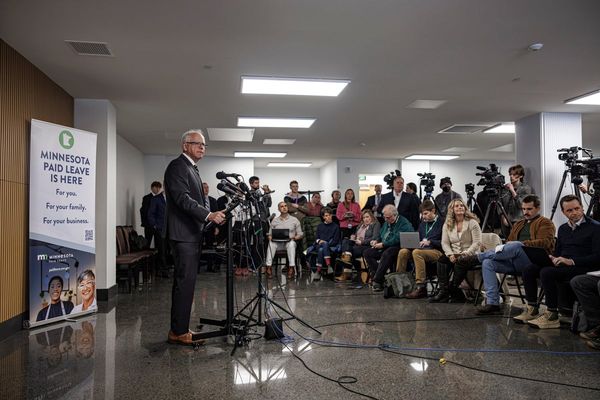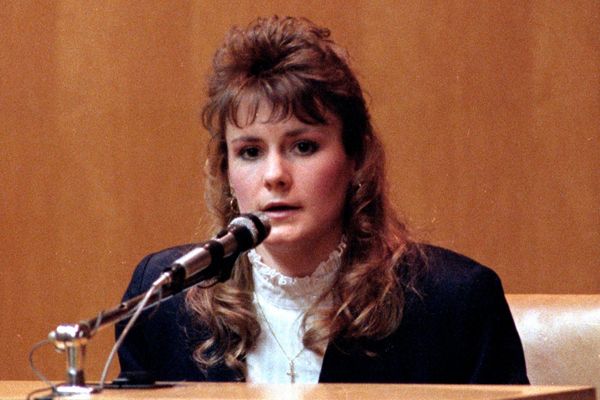LOS ANGELES — The University of California system agreed Tuesday to settle lawsuits brought by hundreds of alleged victims of a former UCLA gynecologist, bringing total litigation payouts to nearly $700 million, the largest ever reached related to sexual abuse involving a public university.
The latest $374.4 million in settlements covers 312 former patients who sued alleging they were abused by Dr. James Heaps under the guise of medical examinations between 1983 and 2018.
Given that Heaps specialized in cancer treatment, some plaintiffs were cancer patients and a handful had late-stage cancers with a terminal diagnosis. One of those women died before the settlement was approved by a Los Angeles County Superior Court judge Tuesday.
The latest settlement comes on top of a $243.6 million settlement of more than 200 women’s lawsuits and a $73 million class-action settlement involving more than 5,000 patients of Heaps dating to 1983. In 2019, the UC system also paid $2.25 million to settle a lawsuit by a patient who alleged she was sexually assaulted in 2018.
In announcing plans to issue medical facility bonds, the UC system declared a portion would be used to fund the expected Heaps settlements because its available insurance coverage has been exhausted.
At the heart of the litigation are allegations that UCLA ignored multiple detailed complaints of abuse over decades. A UC system report found that UCLA repeatedly failed to investigate the allegations adequately. UCLA allowed Heaps to return to practice in 2018 to find new victims, the suits claim, even though top university officials knew of an ongoing internal investigation into the allegations.
Attorney Jennifer McGrath, who represents the plaintiffs, said UCLA turned a blind eye to decades of reports by patients and employees because he was the top earner for UCLA Health. “It is a culture of silence. she said. “UCLA still hasn’t disciplined or terminated any decision makers who allowed Heaps to keep practicing.”
Darren Kavinoky, another lawyer for the plaintiffs, said that even though UCLA investigators had already gathered extensive evidence against Heaps in 2018, the university “continued to pack his waiting room for months before his retirement and never announced they rooted out an alleged sexual predator” until his arrest in 2019.
Heaps is still facing criminal charges involving seven of those patients. He has denied any wrongdoing.
UCLA refused to say whether any other university officials were disciplined, dismissed or forced to retire because of their actions related to Heaps. No one else has been charged.
The cost of the UC settlements exceeds payouts by Michigan State University and the University of Michigan to resolve lawsuits brought by patients who alleged sexual abuse by school doctors. It also dwarfs a settlement reached involving the Penn State sex abuse scandal.
It is still less than the $1.1 billion the University of Southern California has paid to settle lawsuits by hundreds of women who accused gynecologist George Tyndall of sexual abuse.
Some of Heaps’ accusers called the settlement a vindication after complaining about the doctor for years and seeing little done.
In May 2021, Heaps was indicted by a grand jury on 21 felony counts — including sexual battery by fraud, sexual exploitation of a patient and sexual penetration of an unconscious person — involving seven patients from 2011 to 2018. He is slated to be tried later this year. If convicted, he could be sentenced to more than 67 years in prison. His lawyer insists Heaps acted appropriately.
“He adamantly maintains his innocence, and we are currently litigating the case in the court of appeal,” said Leonard Levine, Heaps’ criminal attorney, who said he has sought a writ to toss a grand jury indictment and dismiss the criminal case.
In a statement announcing the settlement, UCLA denounced the doctor, saying: “The conduct alleged to have been committed by Heaps is reprehensible and contrary to the University’s values. Our first and highest obligation will always be to the communities we serve, and we hope this settlement is one step toward providing healing and closure for the plaintiffs involved. We admire the plaintiffs’ courage in coming forward and appreciate plaintiffs’ counsel’s commitment to resolving the claims.”
Since his initial arrest in June 2019, hundreds of women have alleged that Heaps subjected them to inappropriate comments, touched them sexually during exams without wearing gloves and simulated intercourse with an ultrasound probe.
The UC system has acknowledged that staff members received complaints about Heaps dating to the 1990s, and that even after it initiated investigations and a detailed report was produced in 2017, another year passed before he retired. UCLA made no public statements about Heaps’ alleged conduct upon his retirement in 2018 after the school declined to renew his contract.
UCLA notified law enforcement of the allegations against Heaps on June 14, 2018. He was arrested in June 2019 and charged with multiple counts of sexual battery involving two patients.
Heaps’ medical license was suspended in 2019 after he pleaded not guilty to the criminal charges.
Attorney John Manly, who led the $243 million settlement, noted a UCLA investigation found major problems in how the university handled the case.
That report found that UCLA’s handling of Heaps and four other doctors accused of misconduct was “at times either delayed or inadequate or both.” Heaps was affiliated with UCLA from 1983 to 2018 in various roles, including as a faculty member at the medical school and a consulting physician at the student health center.
The report noted that his medical students complained on feedback forms that he was “very touchy,” “very inappropriate,” and made “comments with innuendos.” In 1999, a colleague in private practice, Michael Johnson, referred a patient to Heaps. Afterward, the woman informed Johnson of Heaps’ inappropriate exam technique and comments. The committee said UCLA was not aware of that complaint.







